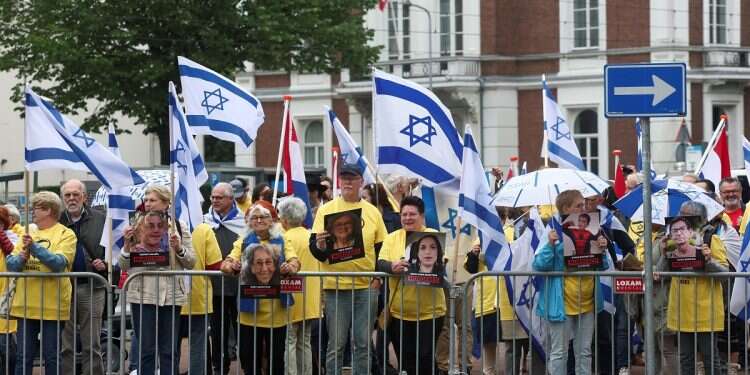The International Court of Justice (ICJ) in The Hague issued its decision on Friday regarding South Africa's petition to halt Israel's actions in the Gaza Strip, all but ordering Israel to halt its military activities in the Rafah area, where it had been preparing for large-scale assault to eradicate the last bastion of Hamas terrorists. Read the full decision here.
The court effectively accepted South Africa's demand that Israel stop its operations in Rafah almost completely, citing the "immediate risk" to Palestinians' rights. It said that "Israel must immediately halt its military offensive, and any other action in the Rafah Governorate, which may inflict on the Palestinian group in Gaza conditions of life that could bring about its physical destruction in whole in part." The order all but orders Israel to avoid any large-scale maneuvers in or near the southern town, where Hamas has apparently created its last major stronghold. However, the court refused to accept South Africa's request to order a total halt to Israeli military operations across the Gaza Strip and left Israel some wiggle room when it comes to action that could be seen as not dangerous to the population in the area.
At the start of its decision, the judge read out its conclusion that the court was "not convinced evacuation measures and other actions Israel has vowed to take are sufficient to alleviate the immense risk which the Pal. population is exposed," referring to the evacuation ahead of the planned invasion of Rafah and that it did not provide necessary safety measures for the Palestinians for "800,000 who need food, shelter, and medicine."
The court has "not sufficiently addressed and dispelled its concern," and in light of this and the provisional measures from January and March," the court finds the current situation arising from the military operation in Rafah, entails irreparable prejudice for real harm. Eventually, it rendered an anti-Israel ruling that required that Israel "halt operation in Rafah: and preserve evidence all across the strip, and that Israel open the Rafah crossing almost without interruption.
The court also ordered "unimpeded" acccess to delegations investigating genocide. Outside, a small group of pro-Palestinian demonstrators waved flags and played a rap on a boom box calling for a free Palestine.
Israel has repeatedly dismissed the case's accusations of genocide as baseless, arguing in court that its operations in Gaza are self-defense and targeted at Hamas militants who attacked Israel on Oct. 7. An Israeli government spokesman said on the eve of Friday's decision that "no power on Earth will stop Israel from protecting its citizens and going after Hamas in Gaza".
https://x.com/Ostrov_A/status/1793997458529509770
While the ICJ's rulings are not legally binding, the upcoming decision had nonetheless raised concerns within Israeli circles. Despite it being in Hague, it is separate from the International Criminal Court, where this week the chief prosecutor officially requested arrest warrants for Israeli Prime Minister Benjamin Netanyahu and Hamas leaders.
According to a senior diplomatic source, Israeli officials had anticipated that the ICJ would issue orders to halt the ongoing military conflict with Palestinian terrorists in Gaza. This expectation stemmed from South Africa's request, submitted on Thursday, for the court to order a cessation of the Rafah offensive.
Today's #ICJ order if Israel should withdraw from Rafah & Gaza, will be delivered by Presiding judge Nawaf Salam of Lebanon.
Here he is, in 2016, as Lebanon's Ambassador to UN, accusing Israel of apartheid, war crimes & terror.
And we are supposed to be believe he is impartial? pic.twitter.com/1cdgbvzKVl
— Arsen Ostrovsky 🎗️ (@Ostrov_A) May 24, 2024
Despite the ICJ's lack of binding authority, Israel is reportedly worried about the potential repercussions of the court's decision, in part because it could ultimately reach the United Nations Security Council, where Israel would need a US veto to stop a binding measure.
International law expert Ido Rosenzweig had correctly predicted that while the World Court may stop short of ordering an outright halt to the war, any order issued that Israel is unable to comply with would constitute a violation of a binding order. This highlights the delicate diplomatic situation Israel finds itself in, even though the ICJ's rulings are not legally enforceable.
The ICJ's decision was expected to carry significant symbolic weight and could potentially influence international public opinion on the ongoing conflict. Israel may face increased diplomatic pressure and criticism from the international community, particularly if the court rules against its military actions in Gaza.
While the ICJ's ruling may not directly impact Israel's operations on the ground, it could have far-reaching implications for the country's diplomatic standing and relations with other nations. The decision underscores the complex interplay between international law, diplomacy, and military conflict in the Israeli-Palestinian conflict.




